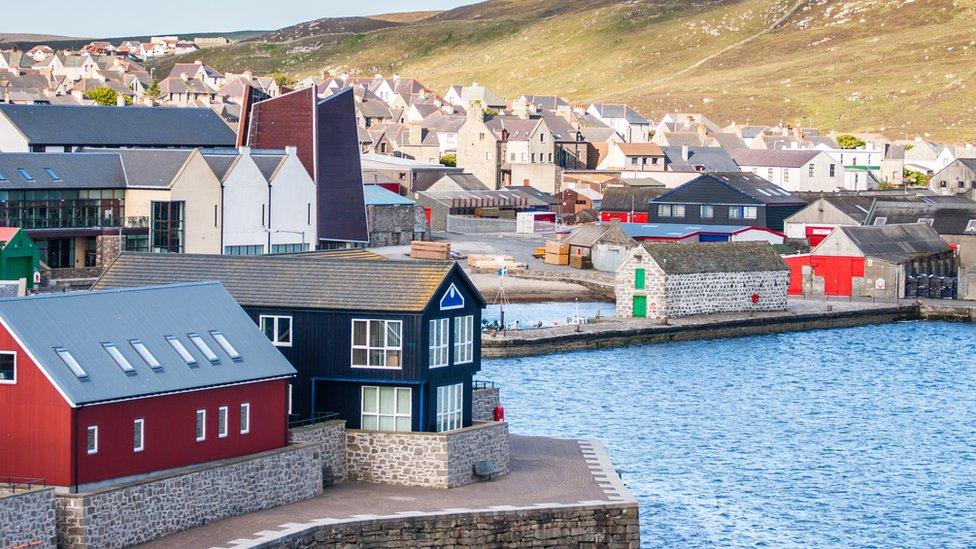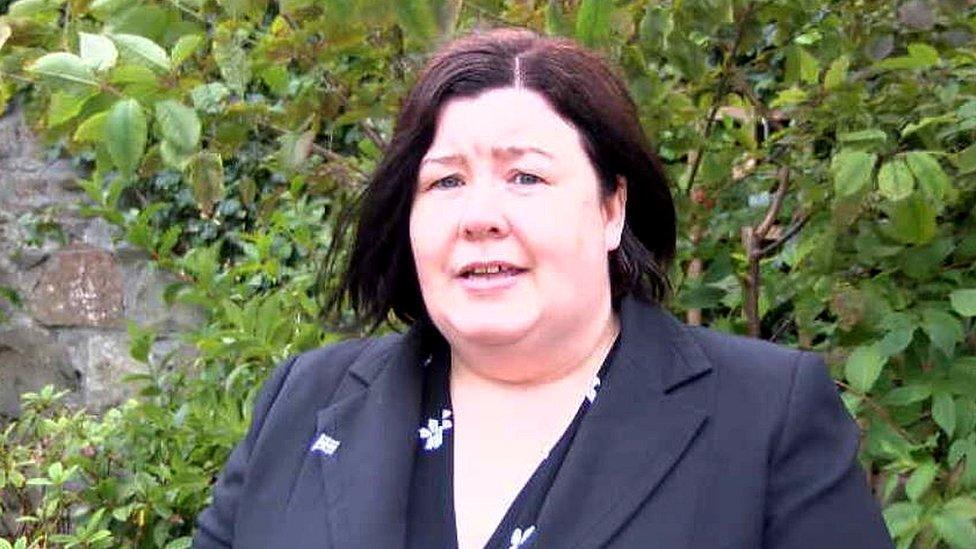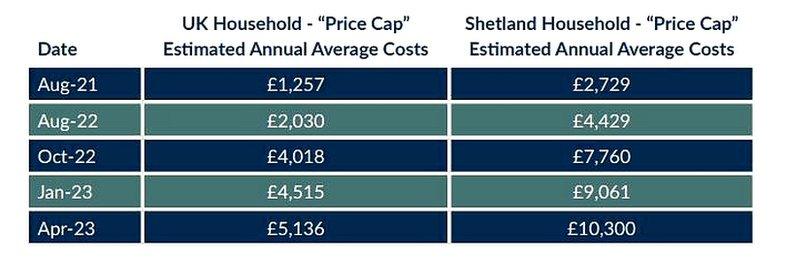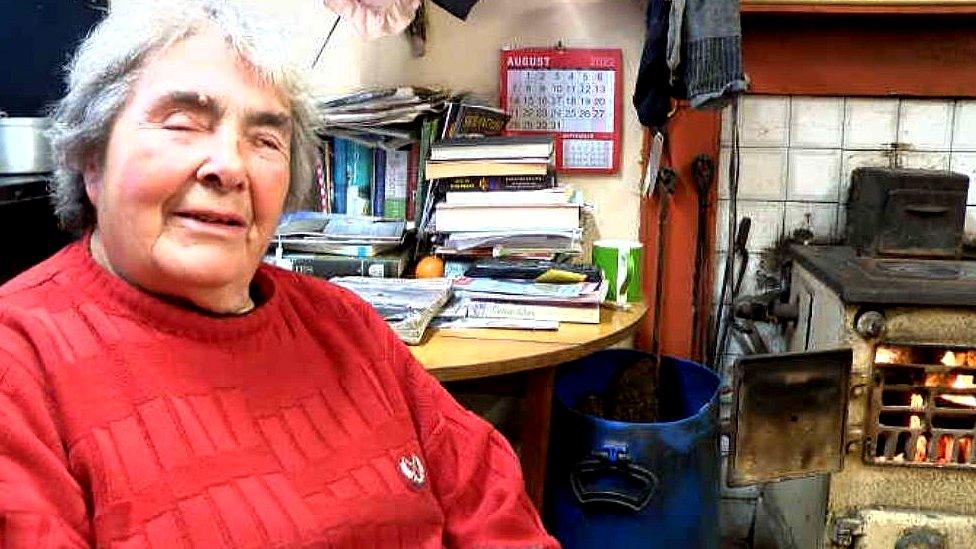Council plea after Shetland's energy bills double
- Published

Islanders in Shetland pay on average double what the rest of the country pays in energy bills
A Scottish council has asked the chancellor for extra help with energy bills after working out its residents are paying double what the rest of the country is charged.
Shetland Islands Council has issued a warning after concluding bills will reach more than £10,000 next year.
The council leader believes 96% of residents will struggle to pay.
Cold weather, wind, lack of connectivity and poor insulation push up energy use on the islands.
The UK government said it had already provided £37bn of support to those most in need.
Council research, external showed that by April 2023, the average energy cost per year for a household will be £10,300 in Shetland compared with £5,136 for the UK.
This October, it is predicted to be more than £7,000, compared with less than £4,000 on the mainland.

Council leader Emma Macdonald said few, if any people in Shetland would earn more than £100,000
Council leader Emma Macdonald told BBC Radio's Good Morning Scotland programme: "We knew it was going to be much higher here but we did some work to find out how high that would be.
"Although we are saying £10,300 could be the bill, some people will potentially be higher than that.
"The cost of living is always higher in Shetland. Anything between 20% to 65% . We have a significantly colder climate, we have homes with poor insulation, no access to mains gas.
"All of those things have an impact. The cost of living is higher but we also have to have our heating on a lot more."
The research claimed households would need to earn £104,000 a year to avoid fuel poverty.
The Scottish government defines fuel poverty as a household spending more than 10% of its income on fuel after housing costs are deducted. It is also in fuel poverty if, after childcare or disability or care costs are deducted, the remaining income is not at least 90% of the UK minimum income standard.
Ms Macdonald said that few, if any, people in Shetland would earn more than £100,000.

Shetland Islands Council has researched the difference in energy prices for the islands
She added that using its reserves to help with exorbitant price rises was not sustainable for the council. She has written to Chancellor Nadhim Zahawi.
"We need to find other solutions and that is why we are calling on the UK government to step in," she said. "This is their responsibility and they need to do something about it.
"We know they are going to have to do something to tackle this but we are asking them to take into account that whatever they put into place they have to make sure it is Shetland-proof because the costs here are much higher and they have to take into account that our bills are going to be double what they are on the mainland.
"People can't wait. They are really worried at the moment and that's why we have written to the chancellor and we hope to get a response really quickly so we can find out how we can move forward."

'We've never seen the benefits of oil and gas'
By John Johnston, BBC Scotland reporter, Lerwick
It's a colder climate, there's wind chill, so energy consumption is much higher. We haven't had much of a summer here so people are keeping their heating on to stay warm.
There's poor insulation in many of the older houses and there's a lack of cheaper energy options. The islands are not on the grid and there is no mains gas.
There's a real irony here because the islands have been at the heart of oil and gas for over 40 years but they have never seen the benefits of lower energy and fuel costs.
The government is providing about £37bn of support and that will see most vulnerable households receive at least £1,200 of support in total this year.
And all domestic electricity customers will receive £400 to help with their bills
But Citizens Advice, which has seen demand for energy advice here double in the last year, says that support is not enough.

Barbara Fraser, 82, has been heating her kitchen with peat for decades but relies on electricity to keep the rest of the croft house warm and power the lights.
She said: "It's absolutely disastrous. A huge rise that nobody expected. It's always a bit colder here. We get a lot of wind.
"I know a lot of the modern houses are really well insulated but a lot of the older houses are not. We really need our electricity companies to take that into account.
"From January it's always that bit colder than it is towards the end of the year, so it's only then we are going to feel it."

Crofter Barbara Fraser burns peat in her kitchen and is worried about bills to keep the rest of her home warm this winter
She added: "I think we probably don't quite realise how awful it is going to be.
"They seem to be able to find the money when it has to be found - they found it for Covid. I would hope they would find it for this crisis as well."
Citizens Advice manager on the island, Karen Eunson, told BBC Scotland: "It's about heating or eating, freezing or starving.
"That sounds very dramatic but there's no avoiding that that looks like the choice people will be thinking about.
"We have already had people come to see us who are very worried about the winter and are talking about not being able to turn their heating on and just scared they are not going to be able to manage."
The Scottish government said the situation was being treated as a public emergency and urged the UK government to freeze the cap for all households, and to support energy companies to deliver.
A spokesman for the UK government said: "We know the pressures people in Shetland and across the UK are facing with rising costs, which is why we have continually taken action to help households by phasing in £37bn worth of support.
"This includes a £400 discount on energy bills over winter and eight million of the most vulnerable households will see £1,200 extra support.
"We also protect households and businesses in the north of Scotland, including Shetland, by providing around £90m every year to reduce electricity distribution charges in that region.
"This is on top of the extra £82m we provided to the Scottish government to help vulnerable families across Scotland at their discretion."